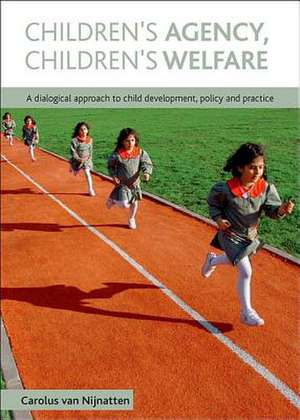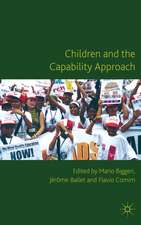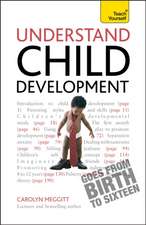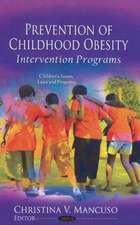Children′s Agency, Children′s Welfare – A Dialogical Approach to Child Development, Policy and Practice
Autor Carolus Van Nijnattenen Limba Engleză Hardback – 7 sep 2010
Children develop agency by interacting with their parents and families; if parental agency proves insufficient, child welfare workers must fill in the gaps. In this holistic study of the development of agency, Carolus van Nijnatten engages social, psychological, and developmental perspectives while maintaining a special focus on child welfare structures and the role of the social worker. A significant contribution to current debates about child welfare and protection, Children’s Agency, Children’s Welfare will be essential reading for specialists in social work, childhood studies, and social policy.
Preț: 774.26 lei
Preț vechi: 1005.53 lei
-23% Nou
Puncte Express: 1161
Preț estimativ în valută:
148.17€ • 154.50$ • 123.14£
148.17€ • 154.50$ • 123.14£
Carte tipărită la comandă
Livrare economică 20 martie-03 aprilie
Preluare comenzi: 021 569.72.76
Specificații
ISBN-13: 9781847424891
ISBN-10: 1847424899
Pagini: 168
Dimensiuni: 175 x 246 x 15 mm
Greutate: 0.45 kg
Editura: Bristol University Press
ISBN-10: 1847424899
Pagini: 168
Dimensiuni: 175 x 246 x 15 mm
Greutate: 0.45 kg
Editura: Bristol University Press
Recenzii
Children's agency, children's welfare is an important and challenging book. It demonstrates the importance of the nature and quality of interactions for influencing child development and that these are central issues for the way child welfare workers and agencies operate and are organised. Nigel Parton, NSPCC Professor in Applied Childhood Studies, University of Huddersfield, England
This book offers a lively and well-developed analysis of the multi-level concept of agency in child welfare, and explores in an original manner the importance of dialogical and narrative approaches in social work practices. This is useful reading for anyone involved in these practices. Kirsi Juhila, Professor of Social Work, University of Tampere, Finland
This is a wide-ranging exploration of child welfare, based in psychology but drawing ideas from across the human sciences. It provides a strong argument for the centrality of dialogic, narrative and language approaches to understanding children, families and their interactions with child welfare professionals. Christopher Hall, School of Medicine and Health and Wolfson Research Institute, Durham University
“This book offers a lively and well-developed analysis of the multilevel concept of agency in child welfare and explores in an original manner the importance of dialogical and narrative approaches in social work practices. This is useful reading for anyone involved in these practices.”
"A very useful framework for critical and innovative analysis of policy and practice. Moreover, it is a good read: interesting, original, clear and well structured."
"An excellent reflective resource for professionals practising in the field, as well as a very useful text for academics, researchers and postgraduate students in social work and childhood studies."
"This is a wide-ranging exploration of child welfare, based in psychology but drawing ideas from across the human sciences. It provides a strong argument for the centrality of dialogic, narrative and language approaches to understanding children, families and their interactions with child welfare professionals."
"Children's Agency, Children's Welfare is an important and challenging book. It demonstrates the importance of the nature and quality of interactions for influencing child development and that these are central issues for the way child welfare workers and agencies operate and are organised."
Notă biografică
Carolus van Nijnatten is a developmental psychologist and professor of the social studies of child welfare at the University of Utrecht.
Cuprins
About the author
Introduction
1 Child, welfare, agency
2 The development of individual agency
3 Social interaction and interactive agency
4 Social agency and social context
5 Diagnosis and dialogue
6 Change and co-construction
7 Dialogical management
8 Dialogical child welfare: conclusion
References
Appendix: Transcript conventions and abbreviations
Index
Introduction
1 Child, welfare, agency
2 The development of individual agency
3 Social interaction and interactive agency
4 Social agency and social context
5 Diagnosis and dialogue
6 Change and co-construction
7 Dialogical management
8 Dialogical child welfare: conclusion
References
Appendix: Transcript conventions and abbreviations
Index














